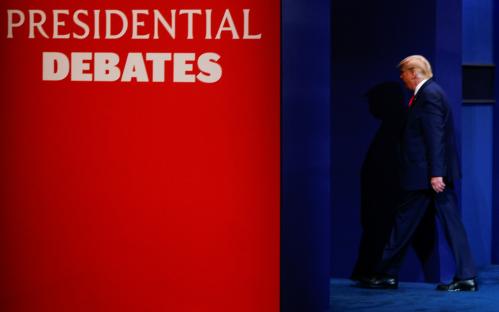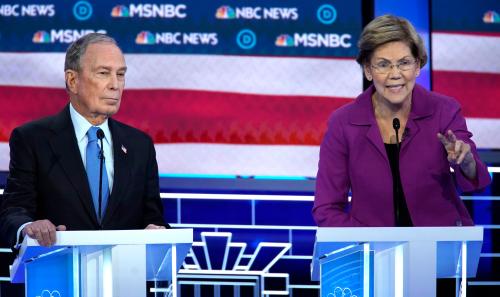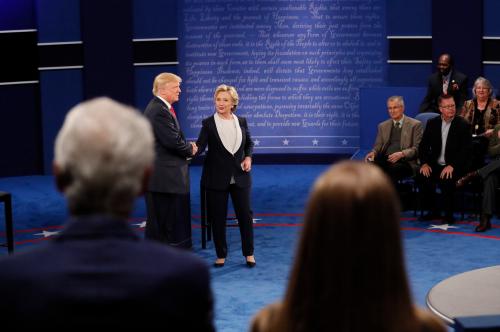After the first Trump-Biden faceoff of the year, last night’s presidential debate was a pleasant surprise and a relatively calm and civil event. In that first debate, President Trump’s near-constant interruptions were seen as beneath the presidency and so disruptive that it detracted from the value of the debate, leading the vast majority of voters to tell pollsters that President Trump lost the contest. No one had ever seen anything like this. And so, we came to a moment where we were so unconvinced presidential candidates could behave themselves that their microphones were not allowed to remain live throughout the duration of the event.
In the final presidential debate of 2020, President Trump—not to mention all Americans—was handed a golden ticket: the moderator’s mute button. A candidate’s microphone could be shut off when the other candidate was allotted time. The president initially perceived the mute button as a slap in the face, as it was an obvious reaction to his prior debate performance. What he failed to appreciate was that the very device intended to silence him was the one that could truly empower him.
Rather than letting President Trump hang himself again, the Commission on Presidential Debates gave him the opportunity to elevate his performance by refusing him the chance to engage in the behavior that damaged him the most. In some sense, the Commission forced civility into the debate by adding the mute mechanism. Mr. Trump criticized this decision, noting to a press gaggle, “I’ll participate. I just think it’s very unfair.” In reality, he should have embraced this decision.
In any other setting, when the president speaks, the world listens. No one can silence the president of the United States—except on Thursday night, when moderator Kristen Welker held the power to do just that. In reality, the simple threat of the use of a mute button significantly improved the demeanor and civility of the debate. There were scant moments where it needed to be used.
Instead the debate focused on a range of policies, and moderator Kristen Welker was firm and moved the candidates from segment to segment in a much more effective manner than other debate moderators this year. Mr. Trump and Mr. Biden’s personalities showed through despite the mute button. President Trump was more pointed and aggressive in his criticisms of the former vice president. Mr. Biden was more demure, while managing to criticize the president and his policies as well.
Being unable to replicate his first debate performance effectively pushed the president away from a strategy to use frequent interruptions to throw Mr. Biden off his game. Instead, the president and former vice president needed to debate in a more presidential way. In many ways, this was a gift to Americans. Thursday night gave voters and prospective voters the debate not only that they wanted, but the debate that they—we—deserved. You heard the clashes in the candidates’ views on the handling of COVID-19, election interference, policies in China and North Korea, healthcare coverage, economic relief, the minimum wage, immigration, race relations in America, and the environment and fracking.
It’s important to note, however, that while this was a more policy-intensive debate that covered a lot of ground, it is not to say that there was no room for fact-checkers. There were multiple comments throughout the debate that had sparse relations with the truth. But the nature of American politics today is that politicians often lie or mislead and it is up to voters, media, and other civic groups to sort out the details after. That was certainly true in this case. But despite that challenge, we as a country learned more about the candidates’ positions and plans than we did in the first debate.
As of the start of the debate, more than 45 million Americans had already voted, but more than 100 million voters have yet to cast their ballots. Many of those voters have already made up their minds, but millions are still undecided. The final debate showed genuine policy differences between the candidates. Those differences were particularly highlighted in the last half of the debate after the (much more muted) personal attacks were squared away in the first 40 minutes.
Beyond changing minds, a debate like this one can also generate turnout. Both candidates were sharper than they were in the previous debate, and that is critical. Seeing sharper candidates talking about specific policies may help ensure that some of the moderate Republicans who distrust Trump or that some of the progressive Democrats who are less than enthusiastic about Biden head to the polls rather than sit on their hands on November 3rd (or in the early voting days prior).
Oddly, Mr. Trump needed to come into this debate as a challenger—punchy and feisty but using his time to distinguish himself from Mr. Biden on the issues, and demonstrating why the next four years required a Trump brand of leadership and ideas. He largely achieved that goal. The only exception was what looked like the classic “Hail Mary” pass of a losing candidate. Trump unearthed a set of new and largely dismissed claims about corruption in Biden’s family. The charges were vague and confusing and probably came from Russian propaganda.
For Mr. Biden’s part, he needed to turn in the performance usually required of an incumbent. He is ahead in the polls, has eight years of White House experience, and needed to convince Americans not that they needed to stick with him, but that they needed to return to him and his stewardship. Thursday night, he generally met those expectations.
Ultimately, the debate performances may have helped any remaining undecided voters to make up their minds—if it didn’t, I don’t know what will in the next 12 days. It may also motivate some voters who were on the fence about voting to head to the polls. But regardless, the final presidential debate finally gave a lot of Americans more faith in this year’s presidential campaign, particularly after the disastrous first debate.
Perhaps the solution is to have more mute buttons for politicians.







Commentary
The debate mute button was a gift to President Trump and all Americans
October 22, 2020